I have written, and re-written, the second half of Miriam’s story a dozen times (read the first part here). It was hard for me to write. Mostly because the topic is so close to my heart.
Over the last few years my heart has broken as I have watched people I know and love, and even people I don’t know, make choices that have caused them to be excommunicated, disfellowshipped, or to voluntarily leave the LDS church. I have grieved and pondered over their situations. My heart breaks for them because some of them don’t fully understand what they have lost, or what they have done. As I thought about them the story of Miriam kept surfacing and re-surfacing in my mind. So several weeks ago I opened my scriptures and re-read the story of Miriam, as told in Numbers 12, and I was astounded at how applicable the story was to their situations. It just reminded me that we are NOT the first generation to ask the hard questions. People of every dispensation have struggled with all of the same spiritual questions and doubts that we still have today. We are not unique by any means.
Questions, Spiritual Ego and Apostasy
In Numbers 12 it tells how Miriam, and her brother Aaron, both spoke out publicly against Moses for his marriage of an Ethiopian woman. This Ethiopian woman has a fascinating story (and will have her own post very soon) and there are several possible reasons for why Miriam and Aaron confronted him about her. I won’t go into all of them in this post, but suffice it to say that the real issue wasn’t his marriage but deeper doubts that Miriam and Aaron had about his role as the prophet and his ability to receive revelation from God.
Miriam and Aaron had both been blessed with spiritual gifts, specifically the gift of prophecy. In fact, Miriam’s gift was so powerful that she was known as “the prophetess”. She had the ability to speak with power and with authority. So when Moses did and taught something that she didn’t like she questioned his ability to receive revelation, saying, “Hath the Lord indeed spoken only by Moses? hath he not spoken also by us?” (Numbers 12:2)
Miriam’s question wasn’t wrong– it was a good question about the way in which God was operating His kingdom on the earth. Later on we see that her process of questioning opened up an important dialogue with God about the role and responsibilities of the prophet. It was because of her question that the Lord was able to give the Children of Israel more understanding about how the priesthood and God’s kingdom operates. The question isn’t what was the problem. The problem was that Miriam had, at at her core, what I have heard called “spiritual ego”. I loved how this woman explained what “spiritual ego” is:
What exactly is the spiritual ego…[it ]is borne the first moment… that a profound spiritual realization has been made. It is that part of self that feels it has accomplished something very special and it causes us to feel superior in relations to others because we believe we have made a realization that sets us apart from the masses. If we find ourselves at any point along the path of spiritual growth and expanding consciousness, feeling that we’ve arrived, conquered, or accomplished something really spiritually superior, and that this accomplishment puts us above others in any way, we can rest assured, we’ve activated the spiritual ego.
When we have spiritual ego we have an over inflated sense of our own spiritual ability and understanding. We begin to think that we are somehow unique, that God has told us or given us something that others don’t have. When we have spiritual ego we don’t ask questions sincerely desiring an answer or direction. Instead we ask a question, already thinking that we know what the answer should be. The problem is that, when the answer comes and it isn’t what you were expecting, it can be really hard to humble yourself and accept counsel. As a result it is usually spiritual ego that causes people to apostatize or leave the church.
For example, this is a quote by Brigham Young about the causes of apostasy and it is uncanny how much of it can be seen in Miriam and Aaron’s actions. He said:
Whenever there is a disposition manifested in any of the members of this Church to question the right of the President of the whole Church to direct in all things, you see manifested evidences of apostasy—of a spirit which, if encouraged, will lead to a separation from the Church and to final destruction…When a man begins to find fault, inquiring in regard to this, that, and the other, saying, “Does this or that look as though the Lord dictated it?” you may know that that person has more or less of the spirit of apostasy…
Brigham Young continued:
Many imbibe [conceive] the idea that they are capable of leading out in teaching principles that never have been taught. They are not aware that the moment they give way to this hallucination the Devil has power over them to lead them onto unholy ground… Such a person will make false prophecies, yet he will do it by the spirit of prophecy; he will feel that he is a prophet and can prophesy, but he does it by another spirit and power than that which was given him of the Lord. He uses the gift as much as you and I use ours… (source).
Can you see Miriam and Aaron in what Brigham Young was saying?
They, whether they realized it or not, had a bad case of spiritual ego. The type of pride that, if goes unchecked, results in apostasy.
Compare this to Moses whom it says in Numbers 12:3, “was very meek, above all the men which were upon the face of the earth.” Moses, who was the prophet of the Lord, was devoid of all spiritual ego. He was humble, contrite, and teachable. He had seen a vision of all of God’s creations and knew, “that man is nothing”(Moses 1:10). He understood, he saw and as a result he was meek and humble. Directly the opposite of the attitude Miriam and Aaron had.
It was a result of their pride that God called Aaron and Miriam to the Tabernacle. He explained to them about the difference between possessing the spiritual gift of prophecy– which both Aaron and Miriam had– and the calling of the prophet– which only Moses had. He told them,
“If there be a prophet [ one who has the gift of prophecy] among you, I the Lord will make myself known unto him in a vision, and will speak unto him in a dream.”
This must have been something that both Aaron and Miriam could relate too. Perhaps they had seen the Lord in a dream or had strong spiritual promptings that had led them to believe that they had more authority and understanding than they really did.
Then the Lord clarified that Moses was not this type of prophet; he was the Prophet who had been called and chosen by God to lead His people and that,
“..with him will I speak mouth to mouth, even apparently, and not in dark speeches; and the similitude of the Lord shall he behold” (Numbers 12:8).
With these words the Lord was clarifying how His priesthood power worked, and who held the right to receive revelation for the church. Making clear that it was not Miriam or Aaron who held these keys and this power.
Leprosy and Living Death
After speaking with the Lord in the tabernacle Miriam was struck with leprosy. It is interesting to me that it is Miriam, and not Aaron, who ended up with leprosy. At first this seems supremely unfair, because even Aaron admits that, “we have done foolishly, and wherein we have sinned.” (Number 12:11)
If they are both at fault, if they both asked the question, then how come it was only Miriam who was cursed with leprosy?
The text in Numbers 12:1 can give us some clues. First, in Hebrew the verb that is translated as “spake against” is in the feminine tense indicating that Miriam was the main speaker. Second, Miriam’s name is listed before Aaron’s in the story indicating that, while Aaron certainly was involved, it was primarily Miriam who instigated and lead the opposition to Moses.
The curse of leprosy is a very interesting consequence for Miriam’s actions. The law of Moses consisted of many physical rules, which while they did often have health benefits, were primarily designed to bear witness of the need for Jesus Christ. Leprosy was no exception, and Miriam’s bout with leprosy was designed to be a physical symbol of her a spiritual ailment.
Let me explain.
Leprosy in the Bible included a wide variety of skin aliments. Among them was what we know as leprosy today, a highly contagious bacterial disease that results in nerve damage, especially in the skin, eyes and respiratory tract. As a result of this nerve damage many people with leprosy are unable to feel pain and often loose parts of their hands, feet, and other extremities due to repeated injuries.It is also possible for the infection to lie dormant for anywhere from 5 to 20 years before symptoms begin to manifest. In Bible times leprosy was thought to be a curse from God because no one knew how you got it, it spread from person to person, and there was no cure for it. Even today, though scientists are able to treat and cure leprosy, they are still unsure about how it is spread.
Understanding the nature of leprosy makes it easy to see why ancient people were terrified of the disease and often required lepers to live outside of cities and limited their contact with others. In fact, in the Old Testament the Law of Moses gives a detailed set of rules concerning how leprosy should be dealt with among the Children of Israel. Leviticus 13:45-46 instructs that a leper’s,
“…clothes shall be rent, and his head bare, and he shall put a covering upon his upper lip (ie, cover his mouth) and shall cry Unclean, Unclean… and he shall dwell alone; without the camp shall his inhabitation be.”
There were also complex rules for determining if a person, a piece of clothing and even a house were infected with leprosy (See Lev. 13- 14).
It is interesting that when you study leprosy in the Bible that it speaks of people being “cleansed” from leprosy and not “healed.” (see Matt. 8:3; Mark 1:42; Lev. 14:7). This is because among the Israelites someone having leprosy was considered “unclean”. This word in Hebrew is tuma and it doesn’t mean “dirty” or “contaminated”.
It is complex word that can’t be directly translated into English, but in the simplest explanation– it is the spiritual state that results from coming in contact with something that has lost its spiritual power. A dead body is the highest form of tuma (or “uncleanliness”) because it has the greatest spiritual potential and thus the greatest “spiritual vacuum” when that life departs. In a similar way a woman is considered tuma after giving birth because while pregnant she is filled with a high level of spiritual power, but when her child is born that power departs. Having leprosy also made someone tuma (unclean) because there was no cure for it and in the eyes of the camp the person was a good as dead. In fact leprosy was sometimes called “living death”.
Miriam was cursed with leprosy– living death– because her spiritual ego had caused her to doubt and fight against God. As a result she had become tuma, “unclean”, meaning that she had lost her spiritual power. Her outward condition of leprosy was a sign of the inward condition of her soul. She had “spiritual leprosy”, the eating away of the spirit that comes through apostasy and sin. Just like physical leprosy kills nerves and destroys your ability to feel, spiritual leprosy destroys the soul’s power and results in a decrease of the ability to feel or to perceive the promptings of the spirit. Brigham Young taught,
“Let a man or woman who has received much of the power of God, visions and revelations, turn away from the holy commandments of the Lord, and it seems that their senses are taken from them, their understanding and judgment in righteousness are taken away, they go into darkness, and become like a blind person who gropes by the wall [see Isaiah 59:9–10;Deuteronomy 28:29] (source).
Today, excommunication and dis-fellowship are our modern day tools for coping with outbreaks of “spiritual leprosy” among our congregations. Just like the Israelites of old we closely examine people for the signs of spiritual leprosy and go through complex procedures to diagnosis the disease (in fact, priesthood authorities dealing with cases of apostasy might find the procedures in Leviticus 13 and 14 to be helpful). We also do everything within our power to help cure or help the infected person. Yet, when there is a real case of leprosy– apostasy– it is imperative for the health of everyone to separate that person from the rest of the group. The key thing to remember though is that this separation is NOT done out of anger, hatred, or even fear. It is done with the hope that 1) the infected person will be healed and return or 2) wallow in misery as the disease eats away at them until they die.
“Let her not be as one dead, of whom the flesh is half consumed when he cometh out of his mother’s womb…Heal her now, O God” (Numbers 12:12)
First, it tells us that the children of Israel didn’t give up hope on Miriam. They had faith that she would be healed of her leprosy– both spiritual and physical- and that she would return to them. They shut her out of their community but they didn’t walk away from her. They waited for her, they prayed for her, and they had faith that she could be healed. This is a powerful reminder to me that we should never give up or walk away from those who been excommunicated, disfellowshipped, or who have left the church voluntarily. We still need to be smart– meaning we might need to separate ourselves emotionally or intellectually from them so that we don’t also get infected– but we don’t need to give up on them. We can pray for them, we can have the compassion for them, and we can have faith that they will be healed.
Because unlike the physical leprosy of the Bible, spiritual leprosy does have a cure–and that is the atonement of Jesus Christ.
And that is powerful.
After she returned to the camp the only other mention we have of Miriam is that she died in a place called Kedesh, and that the children of Israel buried her there (Numbers 20:1). We don’t know if after Miriam’s return to the camp she regained her position of leadership among the children of Israel, but I’d like to think she did. God teaches us that,
“Behold, he [she] who has repented of his [her] sins, the same is forgiven, and I, the Lord, remember them no more.” (D&C 58:42)
Even today people who come back after excommunication have their records washed clean, with no mention of excommunication on them. So perhaps the same was true for Miriam. Regardless, what we do know is after she came back she traveled with her people and dwelt with them again until the day of her death.
Yet like the children of Israel I am not going to walk away and leave them behind.
I am going to wait.
Filling my heart with prayers and living with hope and anticipation for that day when– just like Miriam did– they come back and claim their spiritual power…again.

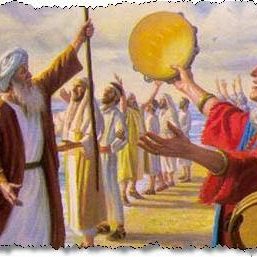
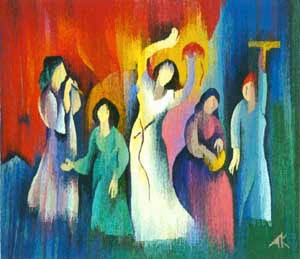
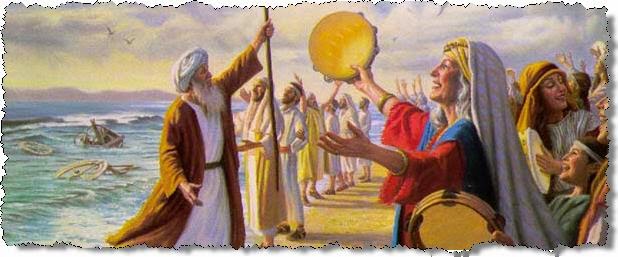
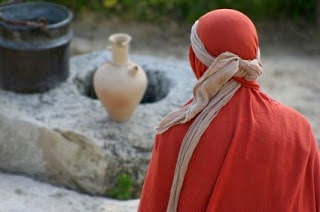
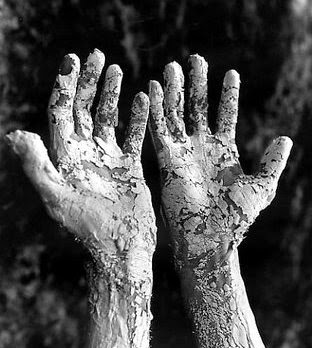






Thank you so much for writing this.
This is marvelous. I can't begin to tell you how much I appreciate the wisdom and compassion and truth in your words. And now I need to read Leviticus again. It's been far too long.
Wow! This was powerful. Thank you.
Something to consider for a person that is voluntarily leaving the church is, we distance ourselves from them because we fear the questions and doubts that arise in us. Often times we become so complacent with our spiritual growth, to our own detriment. I believe God needs us to come to a place where we are truly seeking the hard answers because that is when he can really come to us and help us. At that point we wouldn't fear the "contaminated" because we would know what we really believe and it would only give us love and empathy in our hearts that we can understand what it's like to be in a hard place. Everyone has to experience their own journey and try to figure out God's will for their own life since no two journeys will be the same. For some that leave I have to be ok with the fact that they feel like they are only doing that what feels best for them.
Wonderful. You make me excited to read the scriptures.
Oh, that is the best compliment I could ever get! I hope you open them up and enjoy 🙂
I love this post…it really has some profound truths that is good for all of us to remember. Its important to remember to not let pride can be our downfall and how we need to be mindful of our thoughts at all times and be humble.
Beautifully written, Heather! Your scriptural insights are absolutely wonderful. You know who you remind me of? Orson Scott Card. He has a series of books called The Women of Genesis. They are fiction, but they are the stories of Sarah, Rebekah, Leah, and Rachel through their eyes. I like them because even though they are fiction, they make the stories real. I feel the spirit when I read them. I feel the same way about you. Thank you for sharing the truth, for making these women real, relatable, and inspiring. Like Ashley D said, you make me excited to read the scriptures too!
heather, i feel famous that you commented on my blog!! i really am loving your essays in the book. thank you for all of the effort you have put into both it and your blog.
Sister
These are powerful insights, thank you. I have always wondered why Miriam was punished so harshly. I understand that "Every good son and daughter must be chastened of the Lord', but in the end Father's loving kindness shows in the love Miram's friends and family maintained for her and that they would "wait' with her.
I can resonate with "spiritual ego", I think that this is a very real struggle, because of that "rush" of knowlege and insight we gain from the Holy Spirit when we are teachers or leaders or in just about any situation. We have to pray for strength to become more "teachable and humble".
A great talk by Elder Robert R Stevers of the 2nd Quorum of the Seventy; an excerpt: "Being Teachable"
"True disciples of the Master are teachable. In just a few words, Abraham gives us much insight into why he was so greatly blessed. He lived a life “desiring to receive instructions, and to keep the commandments of God.” “Desiring to receive instructions” is more than a willingness to listen. When our desire to receive instruction is a greater force than our comfort in remaining as we are, we become teachable."
"President Brigham Young taught our “first and foremost duty [is] to seek the Lord until we open the path of communication from God to our own soul.”
Thank you Heather
Beautifully written– thank you! I can relate to this because I have family members I dearly love who have taken themselves out of the Church. But also because I appreciate the reminder to stay humble and teachable.
Thanks again!
Thank you for this post, and this previous essay on Miriam. I am reading the Old Testament for the first time. I am also struggling emotionally as my entire family (of origin) has left or is in the process of leaving the church. To be honest I hadn't really considered that they may choose to return. It gives me hope.
This post was amazing! Thank you for sharing your wonderful insights. It's incredible that events from so long ago can provide such a timely lesson for us today. I know I will refer back to this post because you clarify so many issues for me.
I was really bothered by the fact that Miriam was cursed but Aaron wasnt. You have really helped me see this in a good light. In fact, I have recently come out of spiritual leprosy so I know exactly what you are saying here… And it was several of your other articles that helped me humble myself and leave fear and doubt behind. Thank you. You are right, it is contagious, it was the doubt from another Mormon friend that started me down that path… Very scary path to be on.
I have enjoyed many of your articles in the past, and I followed a link to this one today. I really enjoy your writing, and you certainly do make the stories come alive! I can see how someone like you would love to read the scriptures.
But as I read them, I simply do not see any evidence in the scriptures for what you see. For example, you say "the real issue wasn't his marriage but deeper doubts that Miriam and Aaron had about his role as the prophet and his ability to receive revelation from God." I just don't see any evidence for that in the text of Numbers 12 (or is it elsewhere?). Maybe you receive this by revelation.
As I continued through your post and read what God said about the Prophet, I was quite discouraged:
"..with him will I speak mouth to mouth, even apparently, and not in dark speeches; and the similitude of the Lord shall he behold" (Numbers 12:8).
With these words the Lord was clarifying how His priesthood power worked, and who held the right to receive revelation for the church."
If this is the case, it doesn't seem to bode well for us as a church. I can't remember the last prophet who has claimed to have these experiences. Is this verse telling us that we as members can know a person is the prophet because he tells us he has these experiences? Or is it saying that this is how the prophet will know he is a prophet, and he is under no obligation to tell anyone else about it?
Katie,
Thank you for your comment. I can see how you might wonder about my interpretation of this story, but remember it is just my interpretation. The beautiful thing about the scriptures is that ever story has multiple meanings and different levels of meanings– like the parables that Jesus gave. There are many ways in which this story might be applied and I was trying to show one of them. I hope that as you study this story more for yourself you will see what I mean, because it really is full of so many beautiful truths.
Also, I think your question about whether God still speaks to the prophet "mouth to mouth" is a really good one. I thought about that too when I was studying this! I think the Lord is really clear here about this, and that YES he will– and still does– speak plainly to his prophet. I don't know if that means that every prophet receives a personal visit from Jesus (though I know that some have and have shared it– like Lorenzo Snow) but I think what it does mean is that they will hear and understand the Lord's will and words with clearness and plainness, just like he was speaking to them. I don't think that would be the same for every prophet. God speaks to us in the way and manner in which we best learn and in the way we need it– so I am sure that way he speaks to his prophets is not always the same. I also know that there is some spiritual knowledge and some spiritual experiences that are not to be shared. God teaches us things that are just for us, and we are suppose to treasure those things up in our hearts. Even the prophet has to make sure that he does not cast his pearls before swine and there are some things that are just not appropriate to share in a broadcast as big as General Conference. I have a feeling that they know much more than they are able to share with us.
I think this is a fascinating topic and it would be really interesting to study this out more and see how God spoke and interacted with his prophets in the Bible and Book of Mormon– I'm sure it is pretty much the same today!
I feel as if my mind has just been opened to an entire new understanding on a deeper level. Thank you for your insight. I am very grateful.